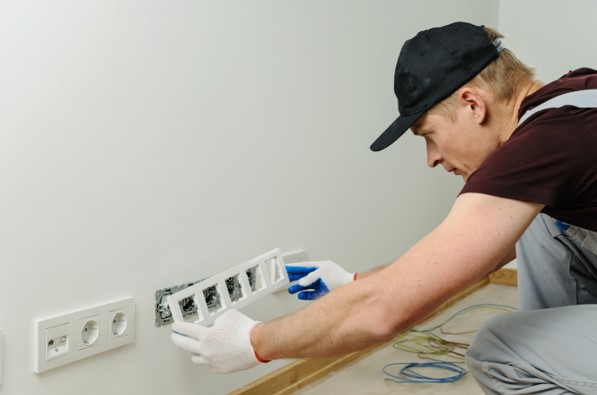From the simple light bulb that eradicates darkness to the sophisticated computers and internet that simplify our lives, electricity is at the heart of almost everything we do today. It has not always been thus, and the journey from crude, rudimentary forms of electrical energy use to the intricate electrical undertakings of today is a fascinating one. This article aims to traverse this journey from the past, via the current state, to the possible future trends of the electrical work landscape, focusing specifically on Australia.
The purpose isn’t merely historical or predictive; we aim to showcase how these shifts have, and will continue to, affect professionals in the field. Their evolving roles and the revolution in education and training will also be part of this comprehensive exploration. Buckle up, for an electrifying ride into the evolution and future of electrical work is about to spark off.
A Bright Shuffle Back in Time: The Progression of Electrical Work
Electrical work has come a long way since the era of candlelight and kerosene lamps. The initial stages, not surprisingly, were fraught with obstacles. Insufficient understanding of electricity, its potential and dangers, and lack of efficient tools and the necessary infrastructure were the main challenges. The task of electrical practitioners in these early days was often confined to powering homes, factories, and public buildings and ensuring their safe use.
As technological and scientific breakthroughs began taking place, the sphere of electrical work widened. Multiple phases of revolution in the industry could be traced, ranging from the great power station era to the electronic age, through to today's renewable energy and digital revolutions. In many ways, Australia was a leader, riding this wave of electrical advancements. For instance, it was one of the first nations to implement a national electricity market and also boasts of an increasing number of houses with solar power installations.
Sparks of Change: Technological Advancements Reshaping Electrical Work
While the past is significant, it is the present that dictates tomorrow. An excellent example of a current trendsetter is Wiselink Electrical, an Australian company that employs cutting-edge technology in its workflow. From machine learning for equipment repair and maintenance prediction to the integration of Internet of Things (IoT) for efficient energy usage in smart homes, the impact of Artificial Intelligence (AI) and related technologies is profoundly reshaping the electrical work landscape.
The gamut of changes brought about by advancements in technology doesn’t confine to procedures and practices. It also expands to the roles and responsibilities of electrician. Gone are the days when sparkies’ duties were limited to installations, repairs and maintenance. Today, as the world moves towards digital, automated, and sustainable solutions, their tasks increasingly involve integrating and servicing IoT-enabled devices, smart homes, and renewable energy technologies.
The Human Element: How Changes in the Electrical Field Have Affected Electricians
This shift in responsibilities has, in turn, necessitated changes in the educational and training programs for electricians. Institutions, notably NECA Education & Careers in Australia, have responded by evolving their syllabi to include advanced modules like automation, AI and sustainability. The training isn't just theory-heavy but focuses on hands-on experience and industry-relevant coursework.
These sweeping changes have also influenced the job market, with a surge in demand for electricians skilled in these advanced technologies. There's an increase in employment opportunities in renewable energy projects, smart home installations, and the burgeoning e-vehicle sector.
The Future is Bright: Predicting Further Changes in Electrical Work
Looking ahead, the electrical field is poised to shift even more dramatically with the advent of 5G, renewables, and energy storage technologies. The implementation of a 5G network will require qualified electricians to install and maintain infrastructure. Likewise, the growth in renewable energy and storage technologies will boost demand for specialized professionals in these areas.
The potential impact of these changes is significant. Traditional electrical infrastructure will need to be updated or replaced. Moreover, new skills, including software abilities and an understanding of advanced energy systems, will become increasingly important for electricians.
Expert Insights: Interviews with Electrical Industry Leaders
We sought insights from industry veterans on these advances. Jean-Luc Ambrosi, a prominent Australian electrical engineer, spoke of the challenges and opportunities brought about by the digital revolution. Sharing his decades of hands-on experience, Ambrosi stressed the need for continuous learning, emphasizing advanced schooling and on-the-job training for today's electricians.
Busting Myths: Deconstructing Common Misconceptions about Electrical Work
Despite the compelling evidence of technology’s impact on electrical work, some myths persist. The most common misconception is that machines will replace electricians. Given the skills electricians need, however, it's clear that humans are indispensable. AI and automation might change the nature of their job, but electricians will continue to be valuable for their technical expertise, critical thinking, judgment, and hands-on skills.
Conclusion
While the evolution of electrical work has been characterised by challenges and changes, it has also brought ample opportunities for those ready to evolve with it. By embracing this change and taking advantage of continuous learning opportunities, today’s electricians can prepare themselves for a future that promises to be even more electrifying.
Let’s keep this conversation going and continue educating others! Share this article with your circles and spark curiosity about the world of electrical work. Together, we all can brighten the road ahead!

